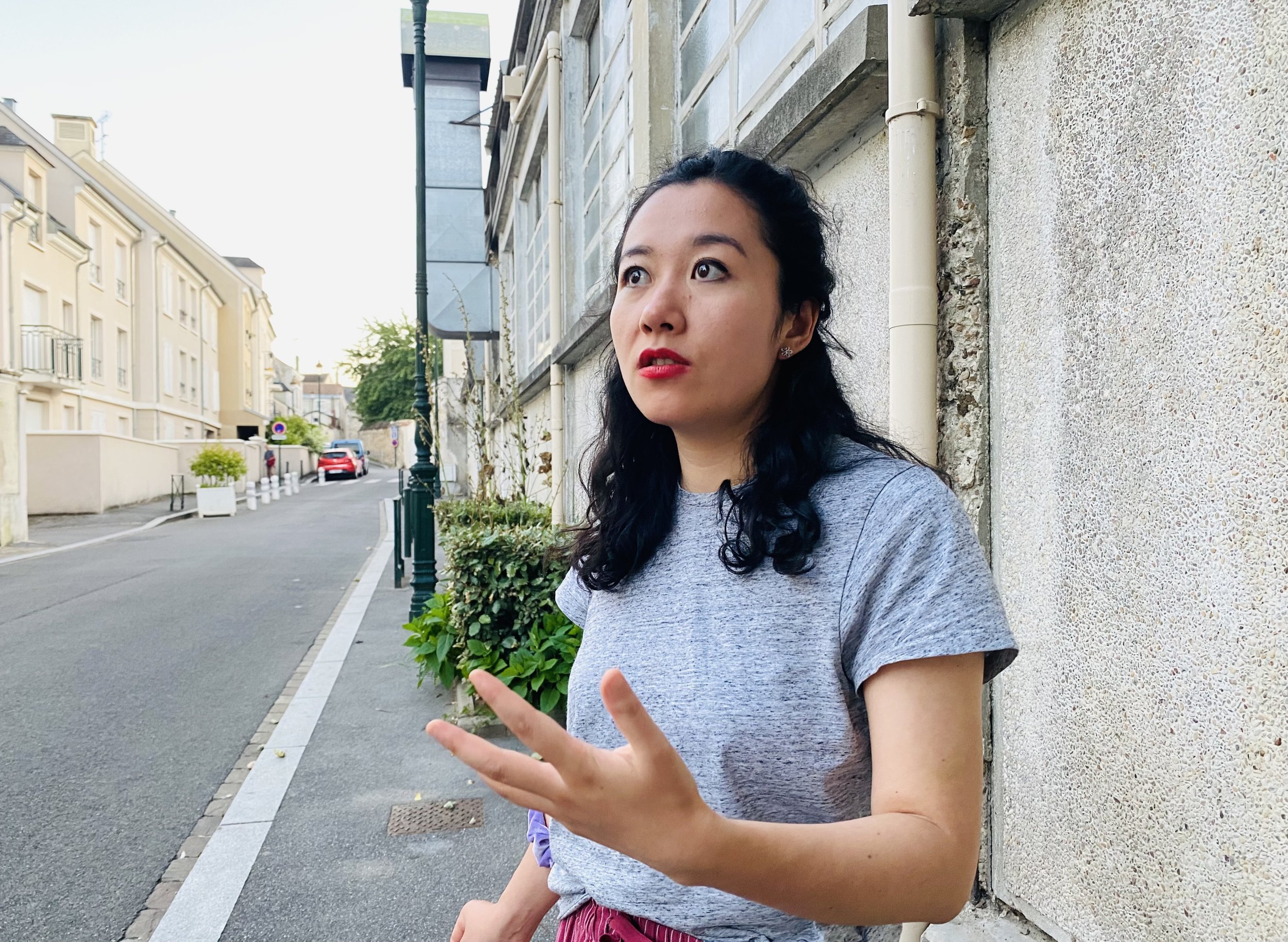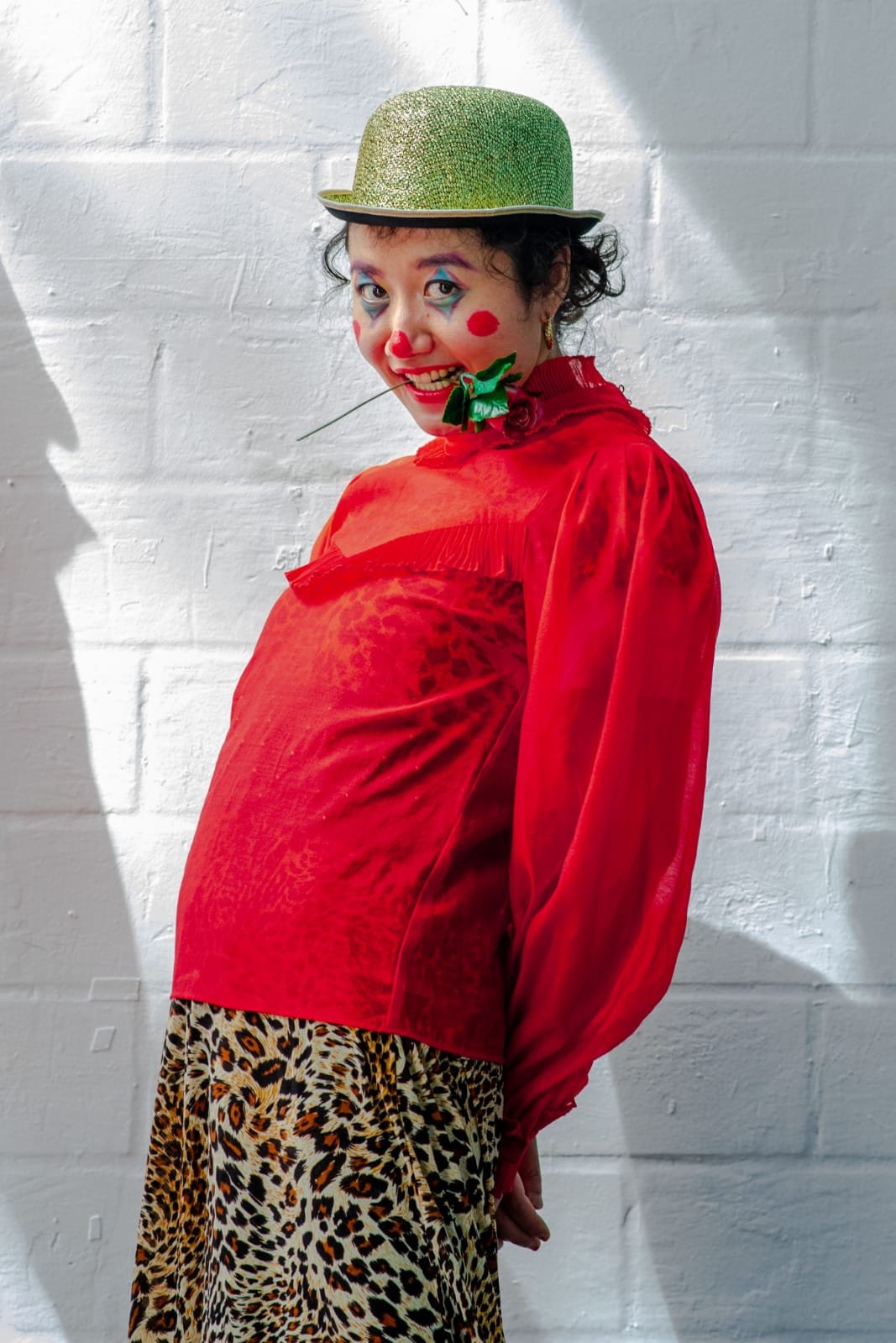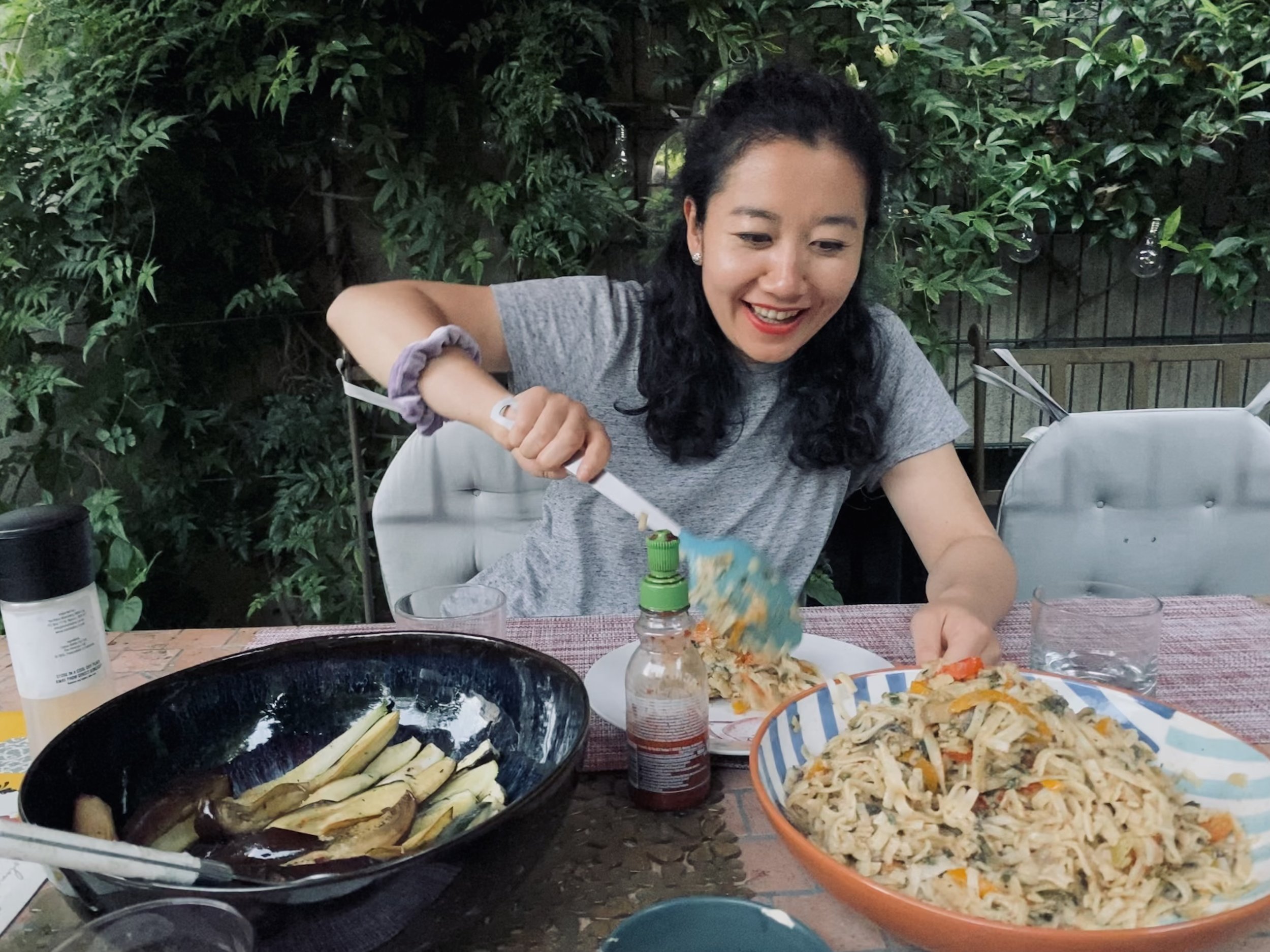Xiaoli Go Is Just Following Her Instincts
How a biomedical engineer became a clown.
Backstory: I met Xiaoli Go when I went to France for a two week clown workshop in August 2021 (spoiler: I decided to stay for a year, but that’s a story for another time.) upon my arrival, I was greeted by four housemates. All clowns. All new. All wonderful. Throughout the course of that two weeks I got to know Xiaoli by going on walks, perusing through the brocante (French farmers market), and shared homemade, household dinners. We talked for two hours while she made her variation of Pad Thai and I asked her questions about her life. A biomedical engineer turned clown turned…we’ll see!
Listening back to this interview almost 6 months after we first spoke, the biggest thing that Xiaoli’s stories and outlook helped me see, is that: there is a joy to risk-taking, if the risk makes you sparkle.
I talk to Xiaoli as she’s making a pad-thai dinner for our household of five. This is the second time she’s made this dish, and she describes it as “maybe being Pad Thai, I’m not following a recipe. Just following instincts”.
Xiaoli has been described by others as fearless three times in my one week of knowing her so far. Talking with her, I realize it’s not the kind of fearlessness that knows what they’re getting into and against all odds finds a way to overcome a hurdle and do what they want.
But rather, the kind of fearlessness that is simply a peace of doing what you want to do without hesitation. Without even a pause to let the fear creep in in the first place. In fact, there was nothing telling Xiaoli not to pursue comedy, because growing up, she didn’t even know what comedy was.
From growing up in the countryside in China, to pursuing a career in biomedical engineering, to becoming a comic, Xiaoli has had a lifetime of practicing this fearlessness everyone around her seems to see.
On New Year's Eve 2017, while working as a medical device regulatory specialist, Xiaoli made a goal for the upcoming year: to do stand-up one time.
That goal of doing one show for the year turned into her joining an improv team and performing 48 stand up gigs by the end of 2018.
Looking back, surely the signs were pointing her to pursue comedy. But having a voice and listening to a voice are two very different things.
Xiaoli Go has approached her life the way she approaches making pad Thai: just following instincts.
Xiaoli in the beginning stage of making her variation of pad thai.
Learning Laughter Through Learning Language
“I feel like I’m always a serious person. The discovery of the English language for me was an escape. I could use it as a tool to reinvent myself. In China, I was a very serious person — studying all the time. But, in English, I can express myself in a way that I couldn’t in China.
In reading English literature, I really learned how to be funny. One of the things I read early on was Oscar Wilde. I don’t know to what extent that influenced me, I don’t think I can even quote Oscar Wilde. But, it’s something that served as a foundation and background and I love that style. I love reading the language itself, the rhythm, and how it flows.
I started reading a bit more. I read “The Little Prince”. I read it in Chinese, then in English, then German, then Dutch. It is my entry book for learning another new language. Reading English helps me understand how to communicate and how to be funny in a way.
In China, we started to learn English in junior high. I never managed to speak one simple sentence of English though. The focus of education was getting the right answer, it was never about speaking the language. I mean, I passed all the English exams, I can do very well in exams.
But when I was in university, when I was 18 or 19, we had a really different teacher. That teacher didn’t really care about the exam questions. What she did was each week she would give us a task. She would say ‘next week we will talk about friendship or family members’, something really simple. A simple topic, then she’d say, you do whatever you want. You can do an essay, a presentation, a PowerPoint, anything you wish.
The first thing I did was Romeo and Juliet. The topic [for that week] was euthanisia, and I sort of imposed Romeo and Juliet onto the topic of euthanasia and wrote some kind of play, some kind of dialogue. Very simple because my English wasn’t that good back then. After class the teacher said to me, ‘that was one of the best English classes I’ve ever had’. I never knew that I could write in English, that I have some kind of intuition towards the language, and I can put it together in a particular way and make it make sense and make it entertaining. That gave me an enormous amount of courage to speak.
I thought about the way she teaches because she gives freedom. With others it’s never fun, with her, it’s fun. You can do whatever. For me, it was the starting point of enjoying the language. To be able to express myself through the language. I am very grateful for that teacher.”
Xiaoli talking outside our shared home.
From Biomedical Engineering To Clowning
“I was quite proud because I received a full scholarship to get my PhD in biomedical engineering at the University of Singapore. I was actually earning money to study. I was doing my PhD but I wasn’t in the mood. It was a bit boring for me. So, I decided to take a two week vacation to Tibet, and I wasn’t thinking that ‘I’m going to quit.’ But, after I got to Tibet, after two weeks I was like, I don’t want to go back. So I continued traveling. Then the school found out that I wasn’t at the school and they kicked me out. I traveled through Central Asia and the Middle East, Jordan was my last stop.
[in 2011] was my first glimpse at stand up. I don’t think I even registered it as stand up. It was entertainment. In a bar, I was there drinking beer and someone was trying to tell a joke with a microphone. So I don’t think I registered it as a specific type of performance or theatre. I was just there, someone was telling a joke, and I wasn't so impressed.
It wasn’t that I was so inspired, it was just entertainment. I didn’t find it funny or think I wanted to be like that, but it was the first time I was introduced to it. But I thought, if I could make people laugh, that would be very satisfying.
All Paths Led to the Stage
“In the year after [I left the] PhD, I wasn’t too happy or proud of myself. I did part-time jobs like serving food and drinks in the motel, I didn’t hate it, actually. It made my mind free because it was mindless. I learned that waitressing is really tough, so exhausting. Sometimes not done until 1 or 2 in the morning.
In 2013, I went to the Netherlands to school. I just went to where I could get a scholarship. [I studied] management policy analysis, entrepreneurship, and health and life science.
On New Year’s Eve of 2017, I made a New Years’ resolution that I will perform one stand-up set in 2018. I made the resolution purely out of boredom. I had moved to the Netherlands, to Ahrnem, a very provincial town. There were other ex-pats but they were settled and had kids.
I didn’t know anyone or anywhere to perform stand-up. It was completely unknown territory. I found Easy Laughs in Amsterdam. I couldn’t find any stand-up courses, so I signed up for improv. I thought ‘what the heck is improv?’ Every week I took the train [from Arnhem to Amsterdam] to practice improv. I met my friend Jess at Easy Laughs. She introduced me to stand up. She took me to one of the venues she knew and introduced me to a promoter, and I asked her if I could perform. By the end of 2018, I had done about 48 stand-up gigs.
I've been doing less improv because in improv you have to be sort of considerate of others and not just do what you think is funny. I enjoy doing new material because I love the writing process.
In 2019 I went to the Edinburgh fringe festival, I [performed in] two shows. A standup show and variety show. I watched loads of shows. A few shows really stood out to me, they were categorized as “clowning”. I was mind blown. I was laughing from the beginning to the end. Afterward, I went up to the performers, I said “this is one of the most hilarious things I’ve ever seen, can I do workshops, can I connect with you?” And their workshop was my first introduction to clowning.”
The Power of Play
I want to play. I think that’s what attracts me to clowning the most. When I saw the clowning the first time at the Edinburgh Fringe, it was the most joyous thing for the audience and performers. I could see the joy oozing from them, it was so beautiful. It is beauty in itself. I think a lot of times we hold ourselves back because we have to be an adult and fit into certain boxes. I’ve learned at the Philippe Gaulier School, they have a very strict curriculum, but in the end it doesn’t matter so much, if you have the spirit to play the game. The format doesn’t have to restrict you.
Do what makes you sparkle
“Within 6 months of me doing standup, I got a headliner gig. It wasn’t paid or anything but it was headlining a charity show. They only planned for 10-15 minutes maximum and I was the last one. But it just went very well and I just kept going, I did 25 minutes and was very proud of myself for that.
One thing I’m very proud of, is sometimes I just do weird stuff on stage, I do this thing as a “passionate badger.” I just love the phrase, to say that out loud — passionate badger. it gives this vivid imagery - it's so funny in my head. I start with one or two things or a phrase, and go from there. If I’m laughing, I write it down.
After I did the passionate badger bit, my improv teacher gave me a hug, and I just felt warm. He was so proud of me. It was absolutely odd, and he gave me a really big hug, and I felt quite acknowledged, and seen, and understood.
Throughout the course of this conversation, Xiaoli used the word sparkling about a dozen times. I ask her if performing makes her nervous and she says with a sparkle in her eyes, “No. Because when I write, it’s what I want to do. I’m always laughing at myself because it makes me sparkle inside.”
There are many reasons people are attracted to comedy. Maybe you grew up making people laugh, or you just see the world in a way that makes people laugh, or you are a character who is inherently funny without trying to be. Maybe it’s how you process your life or observe your life, or just live your life.
But for Xiaoli, none of these quite fit. She has had as unique of a journey as she is a person.
When I ask Xiaoli what she wants most from her life, her response is quick, as if it’s always on the tip of her tongue.
“Joy. I want joy. I want to play. I want to learn. These are my pillars: joy, play, learning, adventure.”
She says this with the kind of conviction that makes you know she’s thought of the answer before. Or, as if she’s always thinking of it. In fact, she says “joy” so quickly it makes you think she must ask herself this question at the start of every day. So quickly it makes you realize that “joy” must be the constant word in the back of her mind as she does anything else, like making Pad Thai.
Xiaoli ends this interview similarly to how she started: stirring the Pad Thai she is almost done cooking now.
“Look at the state of the noodles. They’re overcooked. We’ve been doing the interview too long! Quite a lot of talking.”
Xiaoli, with her completed Pad Thai.
Follow Xiaoli Go on YouTube here
The comedy show that got Xiaoli interested in clowning at the Edinburgh Fringe Festival, was put on by the company Mad Etiquette, from co-directors Dan Lees and Neil Foster
The theatre where Xiaoli first started doing improv in Amsterdam is Easy Laughs.
Xiaoli Go is a Chinese-Dutch comic and medical device regulatory specialist, although don’t be surprised if that list of descriptors keeps growing. This interview took place on August 14, 2021, in our shared kitchen in Etampes, France.



